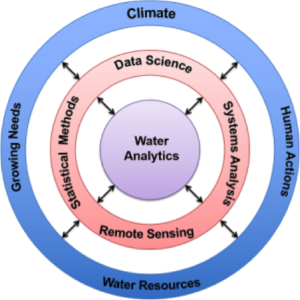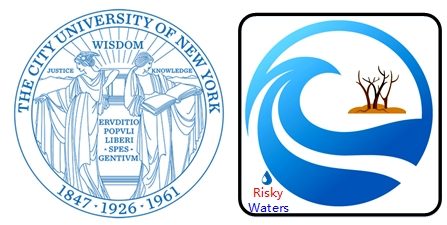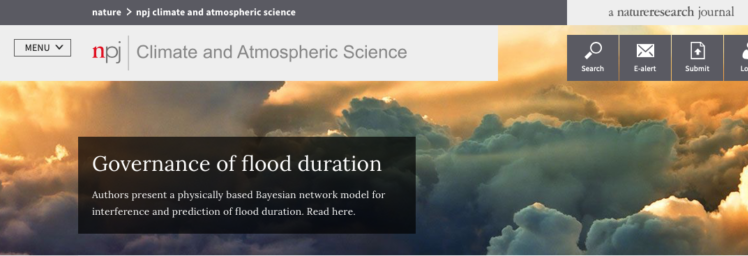In the Risky Waters Lab, we are focused on modeling of water systems and developing integrated risk hedging methods using multi-scale climate information. Our research team works on a domain of issues related to water resources and hydrology that require rigorous systems based inquiry and involve methodical quantification of uncertainties. Large-scale dynamics of hydroclimatology and their relations to oceanic, atmospheric, and land surface conditions and how they map to global and regional water sustainability form the crux of our research.

Ensuring water sustainability is a major challenge for the coming decades, particularly in the face of urbanization, industrialization, and a rapidly growing global population. Our work addresses this significant area, exploring water risks, floods and droughts, their climate determinants over multiple centuries, and how these may affect interlinked human activities at various scales of cities, river basins, and nations. We are leading the exploration, development, and application of new statistical and numerical methods to water-climate problems.
–
The current initiatives in the Risky Waters Lab are:
Water Sustainability
Water scarcity is a concern for the sustainability of life and human societies. Today many countries are facing severe and persistent water resources crisis owing to a growing imbalance of supply and demand. The simultaneous effects of agricultural growth, industrialization, and urbanization coupled with declining surface and groundwater quantity, regional water disputes, and inefficiencies in water use practices are some of the crucial problems facing the water sectors globally. The effects of climate variability and change, including increasing frequency of extreme phenomena (e.g., droughts and floods) are also creating pressures on scarce water supplies. As water bodies go dry, there is an increasing threat to food self-sufficiency and sustainability across the world. High rainfall variability and increasing consumptive use across the globe exacerbates the situation further and is a constraint on the reliable supply of water for various needs and future development.
Under the Water Sustainability Initiative, we focus on developing fundamental knowledge in risk assessment and management for water and environmental sustainability, considering linkages between climate, water supply, competing demands, and institutional constraints. We are developing strategies for water and food security for nations in the face of climate constraints and competing demands so they can serve as a basis for targeting policy interventions.
Hydrometeorological Extremes
Multi-timescale climate variations due to natural processes such as ocean-atmosphere interactions and anthropogenic forcing lead to spatiotemporal correlations in hydrometeorological extreme events. From a risk management perspective, one has to focus on the prediction of the timing and co-location of these events, their interrelationships, as well as how their statistics may change with time. There is also a need to understand the various flood types, their spatiotemporal characteristics and causes based on rainfall statistics, antecedent flow conditions, and atmospheric teleconnections.
Under the Hydrometeorological Extremes Initiative, we focus on strategies for the prediction, and integrated management of climate and weather extremes using physics informed predictors. Our work includes an investigation into the causality of hydrometeorological extremes using Information Theory. We are developing a unified prediction and adaptive risk management framework using Bayesian multi-scale modeling.
Dynamic Risk Management
Dynamic Risk Management is the overarching framework for our research. Dynamic Risk is the risk that changes with time due to natural or anthropogenic factors, and evolving social priorities. Dynamic Risk Management (DRM) framework is a formal approach to adaptation to such changes. DRM framework will assess the risk exposure of water systems in a time-varying manner conditional on factors that lead to either cyclical or monotonic change. It also factors in the changes in exposure to risk given societal adaptation and mitigation actions.
We are creating integrated strategies for estimation, prediction, and decision support at different lead times to support adaptive risk management. A probabilistic framework using Bayesian methods is used to address modeling and informational uncertainties, and to facilitate quantitative decision-making. Currently, we are focusing on understanding decadal to multi-decadal hydroclimatic variability using observed and paleo streamflow records and future climate projections. We combine them with adaptation actions to inform infrastructure investments and periodically update sectoral and interstate allocation rules. DRM framework provides a capacity to assess the implications of climate, policy, water demand, water conservation, and infrastructure development scenarios on socio-economic and water outcomes.
These research initiatives have been supported by grants from Department of Energy’s Office of Science (DOE), National Science Foundation (NSF), National Oceanic and Atmospheric Administration (NOAA), Microsoft’s AI for Earth program, University Transportation Research Center (UTRC), CUNY Research Foundation (RFCUNY) and Oakridge Associated Universities (ORAU).







